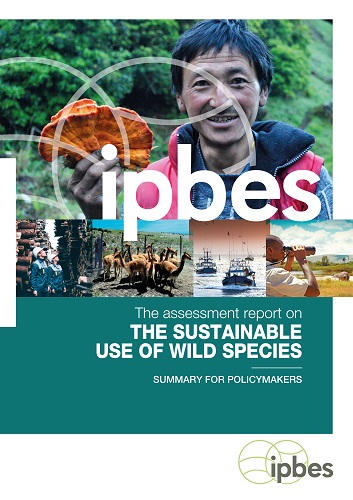Professor Tasman Crowe discussess IPBES report on sustainable use of wild species
 On 8 July 2022, RTE Radio 1 News at One spoke to Professor Tasman Crowe, UCD Earth Institute director and chair of the National Biodiversity Forum, about the new the Intergovernmental Panel for Biodiversity and Ecosystem Services (IPBES) Assessment Report on the Sustainable Use of Wild Species. The IPBES report, Professor Crowe said, “warns that overexploitation is a huge threat to the survival of wild species and calls for that to be reversed. It is the second biggest cause of biodiversity loss after habitat destruction.”
On 8 July 2022, RTE Radio 1 News at One spoke to Professor Tasman Crowe, UCD Earth Institute director and chair of the National Biodiversity Forum, about the new the Intergovernmental Panel for Biodiversity and Ecosystem Services (IPBES) Assessment Report on the Sustainable Use of Wild Species. The IPBES report, Professor Crowe said, “warns that overexploitation is a huge threat to the survival of wild species and calls for that to be reversed. It is the second biggest cause of biodiversity loss after habitat destruction.”
The IPBES report on sustainable use of wild species published in July 2022 warns that up to one million plants and animals face extinction and notes the interconnectedness of human beings, the national environment, and biodiversity with one in five people relying on wild species for food and income.
Professor Crowe further emphasised this while speaking to RTE Radio, saying “We have many very close relationships with nature … as well as food and income, we depend on those species to maintain our systems and also to bring a sense of cultural connection and wellbeing so we really do have an intimate relationship with nature and need to think very carefully about that relationship and how to improve it.”
The IPBES report states that biodiversity is rapidly being lost through overexploitation as well as climate change and that we are damaging and replacing ecosystems with our own infrastructure and activity. Professor Crowe added that “Biodiversity is essential for mitigating climate change, for absorbing carbon in forests and oceans and also to help us to deal with climate change – for example through coastal protection by coastal marshes.” The IPBES report highlights the significant impact climate change is having on biodiversity and the additional challenges this raises.
The national and global nature of the problem of overexploitation of biodiversity as well as potential solutions is also a key aspect of the IPBES report. Professor Crowe said, “We have a strong dependency on wild species in Ireland and there’s a big push in Europe to manage our interactions with nature and to do a better job of conserving and restoring nature. In Ireland, the wild species that we are most dependent on harvesting are fish and shellfish. We have a wide range of commercial fisheries that are essential to coastal communities.” Professor Crowe also emphasised that Ireland’s influence ranged beyond Ireland’s national shores: “we also import many goods from overseas that are based on wild species.”
Professor Crowe also emphasised how, in the UN Decade on Restoration, it is important to “repair some of the damage that we’ve done and restore natural systems as best we can” with rewilding being a key aspect of not just halting biodiversity loss but reversing it.
The IPBES report also makes it clear, Professor Crowe later said, that approaches are more likely to succeed if they are participatory and inclusive – involving the stakeholders as well as the state agencies and experts – so that there is a sense of stewardship and co-management. Through this approach, Professor Crowe said, "we can arrive at solutions that are tailored to each particular social and ecological context. We need a good evidence base for the decisions that are made and we need to take care that the rationale is clear to those involved."
Professor Crowe later concluded, "The IPBES report also points out that there are great opportunities to benefit sustainably from wild species, but we really need to transform the human-nature relationship – and recognise that we are part of natural ecosystems, not apart from them."
About the IPBES report
>
The Intergovernmental Panel for Biodiversity and Ecosystem Services (IPBES) is the biodiversity equivalent of the Intergovernmental Panel for Climate Change (IPCC). Its reports are prepared by leading experts from all around the world and are the most authoritative statements we can turn to to understand the status of biodiversity and ecosystems, our dependence on them, the pressures on them, and the steps that we should be taking to change our relationship with them.
The IPBES Assessment Report on the Sustainable Use of Wild Species has been in preparation since 2018 and was released in July 2022. It was written by 85 leading experts with 200 additional contributors from 139 member states based on all available evidence. A further IPBES Values Assessement on Decisions based on Narrow Set of Market Values of Nature Underpin the Global Biodiversity was also published in July 2022.
- Listen to Professor Tasman Crowe discuss how the 2022 IPBES report warns of accelerating global biodiversity crisis
- Read the IPBES Global Assessment Report on Sustainable Use of Wild Species
- Read the IPBES Values Assessment - Decisions Based on Narrow Set of Market Values of Nature Underpin the Global Biodiversity Crisis


